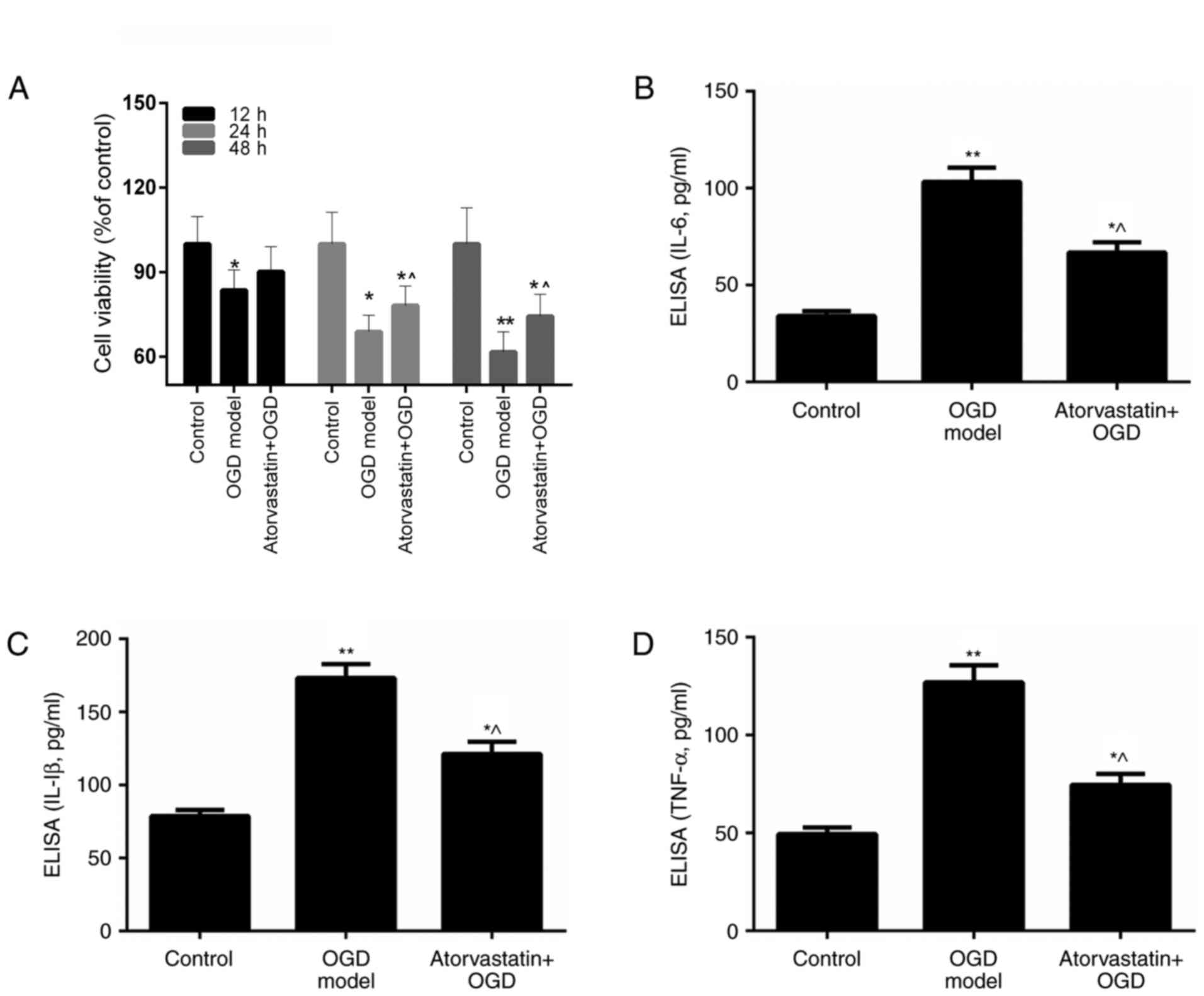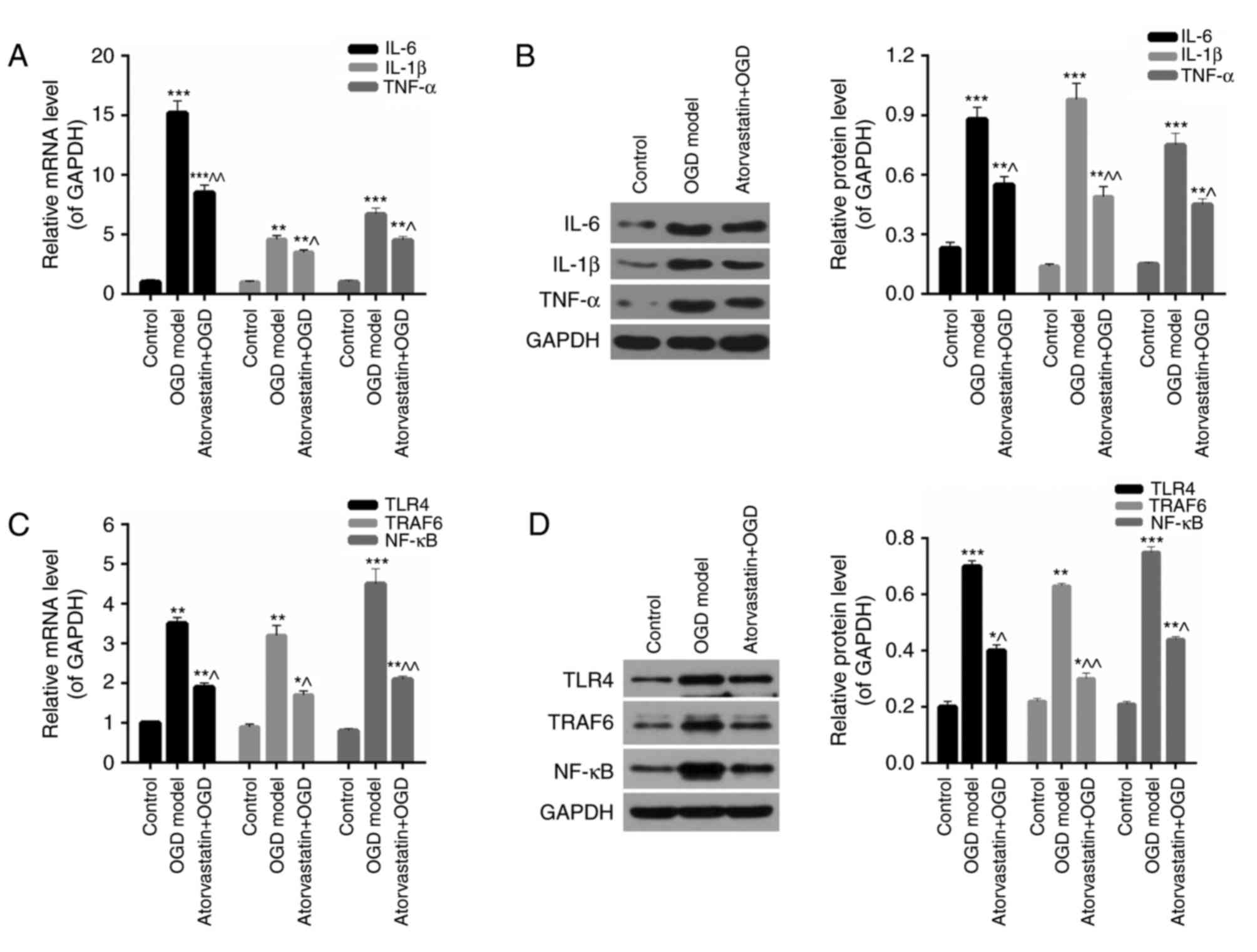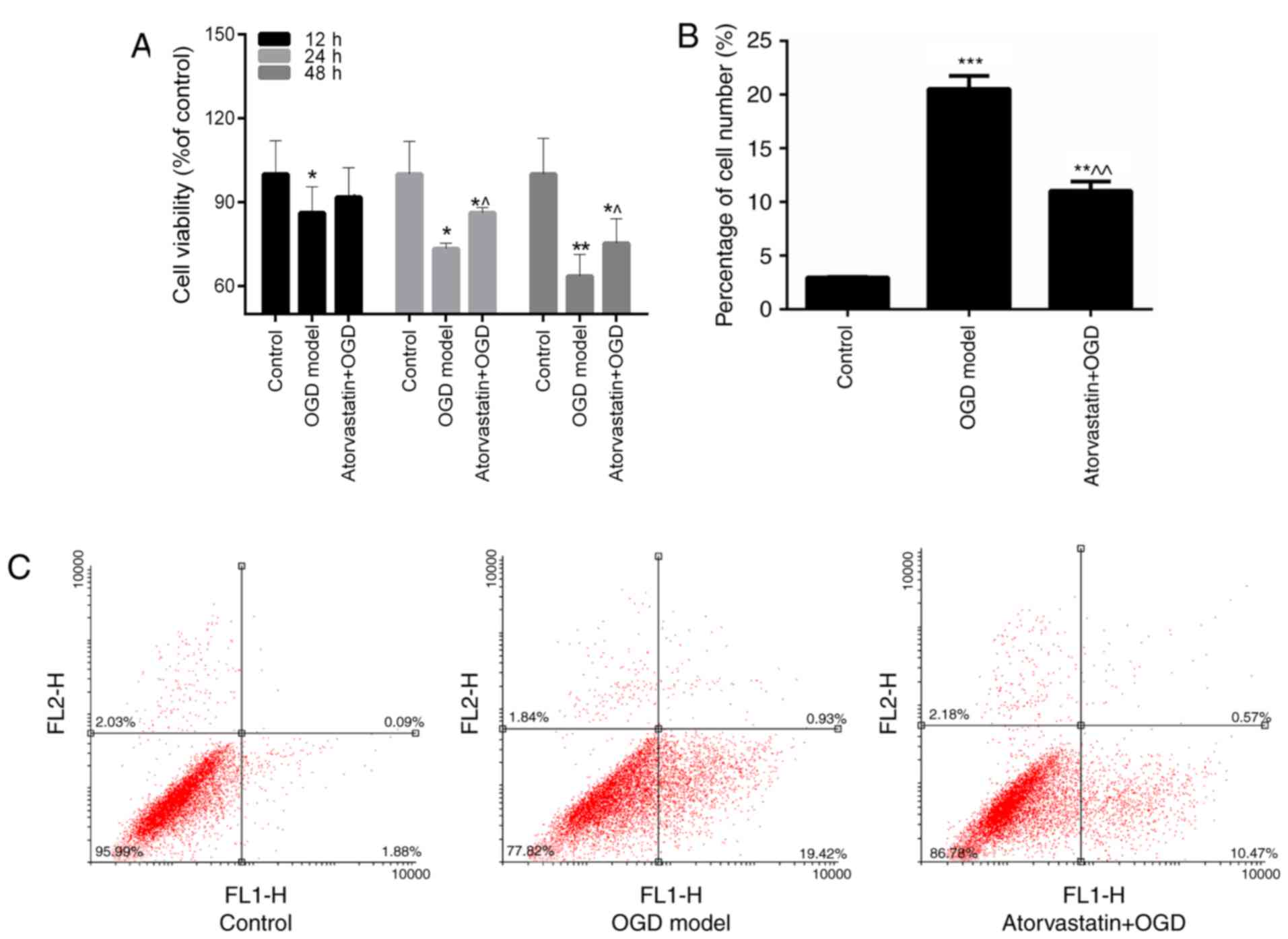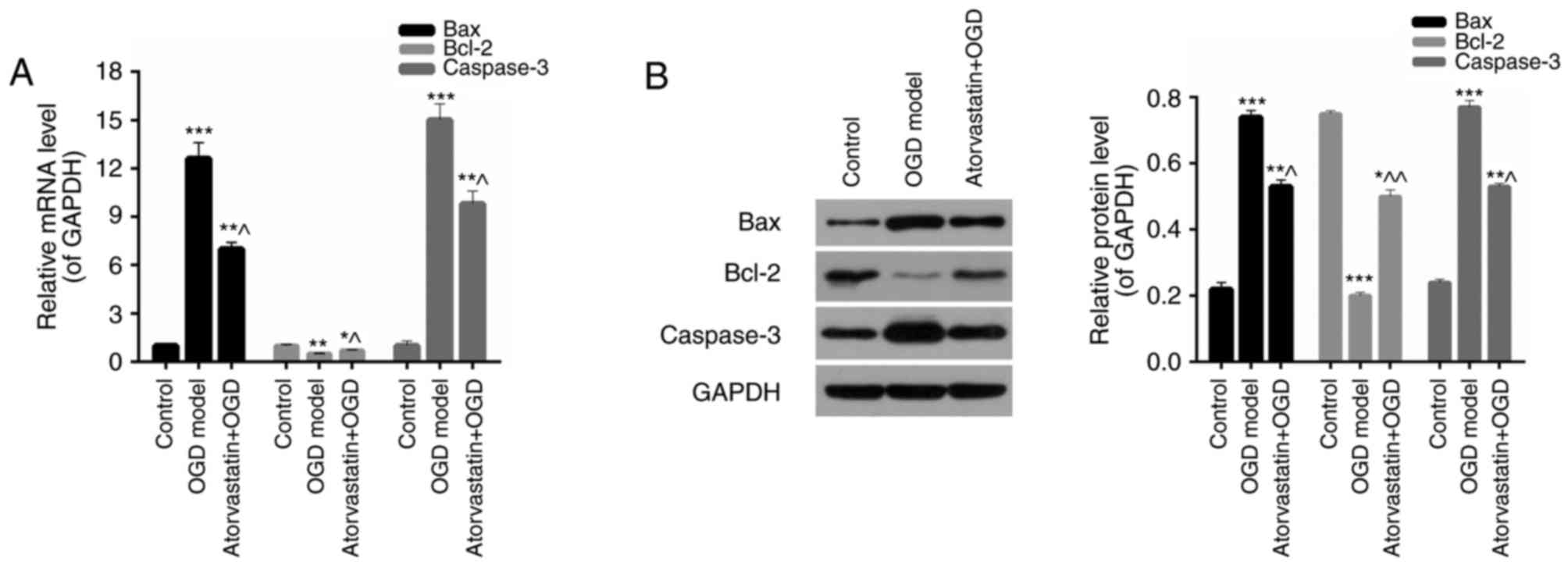|
1
|
Brown KL, Cosseau C, Gardy JL and Hancock
RE: Complexities of targeting innate immunity to treat infection.
Trends Immunol. 28:260–266. 2007. View Article : Google Scholar : PubMed/NCBI
|
|
2
|
Colton CA: Heterogeneity of microglial
activation in the innate immune response in the brain. J
Neuroimmune Pharmacol. 4:399–418. 2009. View Article : Google Scholar : PubMed/NCBI
|
|
3
|
Amantea D, Nappi G, Bernardi G, Bagetta G
and Corasaniti MT: Post-ischemic brain damage: Pathophysiology and
role of inflammatory mediators. Febs j. 276:13–26. 2009. View Article : Google Scholar : PubMed/NCBI
|
|
4
|
Lage JM: 100 Years of Alzheimer's disease
(1906–2006). J Alzheimer Dis. 9 Suppl 3:S15–S26. 2006. View Article : Google Scholar
|
|
5
|
Aguzzi A, Barres BA and Bennett ML:
Microglia: Scapegoat, saboteur, or something else? Science.
339:156–161. 2013. View Article : Google Scholar : PubMed/NCBI
|
|
6
|
Czirr E and Wyss-Coray T: The immunology
of neurodegeneration. J Clin Invest. 122:1156–1163. 2012.
View Article : Google Scholar : PubMed/NCBI
|
|
7
|
Lee CY and Landreth GE: The role of
microglia in amyloid clearance from the AD brain. J Neural Transm
(Vienna). 117:949–960. 2010. View Article : Google Scholar : PubMed/NCBI
|
|
8
|
Perry VH, Nicoll JA and Holmes C:
Microglia in neurodegenerative disease. Nat Rev Neurol. 6:193–201.
2010. View Article : Google Scholar : PubMed/NCBI
|
|
9
|
Swardfager W, Lanctot K, Rothenburg L,
Wong A, Cappell J and Herrmann N: A meta-analysis of cytokines in
Alzheimer's disease. Biol psychiatry. 68:930–941. 2010. View Article : Google Scholar : PubMed/NCBI
|
|
10
|
Eikelenboom P, Rozemuller AJ, Hoozemans
JJ, Veerhuis R and van Gool WA: Neuroinflammation and Alzheimer
disease: Clinical and therapeutic implications. Alzheimer Dis Assoc
Disord. 14 Suppl 1:S54–S61. 2000. View Article : Google Scholar : PubMed/NCBI
|
|
11
|
Wesselingh SL, Takahashi K, Glass JD,
McArthur JC, Griffin JW and Griffin DE: Cellular localization of
tumor necrosis factor mRNA in neurological tissue from HIV-infected
patients by combined reverse transcriptase/polymerase chain
reaction in situ hybridization and immunohistochemistry. J
Neuroimmunol. 74:1–8. 1997. View Article : Google Scholar : PubMed/NCBI
|
|
12
|
Matusevicius D, Navikas V, Söderström M,
Xiao BG, Haglund M, Fredrikson S and Link H: Multiple sclerosis:
The proinflammatory cytokines lymphotoxin-alpha and tumour necrosis
factor-alpha are upregulated in cerebrospinal fluid mononuclear
cells. J Neuroimmunol. 66:115–123. 1996. View Article : Google Scholar : PubMed/NCBI
|
|
13
|
Walter S, Letiembre M, Liu Y, Heine H,
Penke B, Hao W, Bode B, Manietta N, Walter J, Schulz-Schuffer W and
Fassbender K: Role of the toll-like receptor 4 in neuroinflammation
in Alzheimer's disease. Cell Physiol Biochem. 20:947–956. 2007.
View Article : Google Scholar : PubMed/NCBI
|
|
14
|
Kaczorowski DJ, Atsunori N, Mccurry KR and
Billiar TR: Toll-like receptors and myocardial
ischemia/reperfusion, inflammation, and injury. Curr Cardiol Rev.
5:196–202. 2009. View Article : Google Scholar : PubMed/NCBI
|
|
15
|
Stevens SL and Stenzel-Poore MP: Toll-like
receptors and tolerance to ischaemic injury in the brain. Biochem
Soc Trans. 34:1352–1355. 2006. View Article : Google Scholar : PubMed/NCBI
|
|
16
|
Gesuete R, Kohama SG and Stenzelpoore M:
Toll-Like receptors and ischemic brain injury. J Neuropathol Exp
Neurol. 73:378–386. 2014. View Article : Google Scholar : PubMed/NCBI
|
|
17
|
Hyakkoku K, Hamanaka J, Tsuruma K,
Shimazawa M, Tanaka H, Uematsu S, Akira S, Inagaki N, Nagai H and
Hara H: Toll-like receptor 4 (TLR4), but not TLR3 or TLR9,
knock-out mice have neuroprotective effects against focal cerebral
ischemia. Neuroscience. 171:258–267. 2010. View Article : Google Scholar : PubMed/NCBI
|
|
18
|
Sato S, Sugiyama M, Yamamoto M, Watanabe
Y, Kawai T, Takeda K and Akira S: Toll/IL-1 receptor
domain-containing adaptor inducing IFN-beta (TRIF) associates with
TNF receptor-associated factor 6 and TANK-binding kinase 1, and
activates two distinct transcription factors, NF-kappa B and
IFN-regulatory factor-3, in the Toll-like receptor signaling. J
Immunol. 171:4304–4310. 2003. View Article : Google Scholar : PubMed/NCBI
|
|
19
|
Kaisho T and Akira S: Toll-like receptor
function and signaling. J Allergy Clin Immunol. 117:979–987; quiz
988. 2006. View Article : Google Scholar : PubMed/NCBI
|
|
20
|
Bi X, Yan B, Fang S, Yang Y, He J, Li XM
and Kong J: Quetiapine regulates neurogenesis in ischemic mice by
inhibiting NF-kappaB p65/p50 expression. Neurol Res. 31:159–166.
2009. View Article : Google Scholar : PubMed/NCBI
|
|
21
|
Valerio A, Dossena M, Bertolotti P, Boroni
F, Sarnico I, Faraco G, Chiarugi A, Frontini A, Giordano A, Liou
HC, et al: Leptin is induced in the ischemic cerebral cortex and
exerts neuroprotection through NF-kappaB/c-Rel-dependent
transcription. Stroke. 40:610–617. 2009. View Article : Google Scholar : PubMed/NCBI
|
|
22
|
Jin JJ, Kim HD, Maxwell JA, Li L and
Fukuchi K: Toll-like receptor 4-dependent upregulation of cytokines
in a transgenic mouse model of Alzheimer's disease. J
Neuroinflammation. 5:232008. View Article : Google Scholar : PubMed/NCBI
|
|
23
|
Endo A, Kuroda M and Tanzawa K:
Competitive inhibition of 3-hydroxy-3-methylglutaryl coenzyme A
reductase by ML-236A and ML-236B fungal metabolites, having
hypocholesterolemic activity. FEBS Lett. 72:323–326. 1976.
View Article : Google Scholar : PubMed/NCBI
|
|
24
|
Dimmeler S, Aicher A, Vasa M, Mildner-Rihm
C, Adler K, Tiemann M, Rutten H, Fichtlscherer S, Martin H and
Zeiher AM: HMG-CoA reductase inhibitors (statins) increase
endothelial progenitor cells via the PI 3-kinase/Akt pathway. J
Clin Invest. 108:391–397. 2001. View Article : Google Scholar : PubMed/NCBI
|
|
25
|
Liao JK and Laufs U: Pleiotropic effects
of statins. Annu Rev Pharmacol Toxicol. 45:89–118. 2005. View Article : Google Scholar : PubMed/NCBI
|
|
26
|
Georgieva-Kotetarova MT and Kostadinova
II: Effect of atorvastatin and rosuvastatin on learning and memory
in rats with diazepam-induced amnesia. Folia Med (Plovdiv).
55:58–65. 2013.PubMed/NCBI
|
|
27
|
Zhang YY, Fan YC, Wang M, Wang D and Li
XH: Atorvastatin attenuates the production of IL-1beta, IL-6, and
TNF-alpha in the hippocampus of an amyloid beta1-42-induced rat
model of Alzheimer's disease. Clin Interv Aging. 8:103–110.
2013.PubMed/NCBI
|
|
28
|
Gordon R, Hogan CE, Neal ML, Anantharam V,
Kanthasamy AG and Kanthasamy A: A simple magnetic separation method
for high-yield isolation of pure primary microglia. J Neurosci
Methods. 194:287–296. 2011. View Article : Google Scholar : PubMed/NCBI
|
|
29
|
Badiola N, Malagelada C, Llecha N, Hidalgo
J, Comella JX, Sabriá J and Rodríguez-Alvarez J: Activation of
caspase-8 by tumour necrosis factor receptor 1 is necessary for
caspase-3 activation and apoptosis in oxygen-glucose deprived
cultured cortical cells. Neurobiol Dis. 35:438–447. 2009.
View Article : Google Scholar : PubMed/NCBI
|
|
30
|
Liu B, Zhang H, Xu C, Yang G, Tao J, Huang
J, Wu J, Duan X, Cao Y and Dong J: Neuroprotective effects of
icariin on corticosterone-induced apoptosis in primary cultured rat
hippocampal neurons. Brain Res. 1375:59–67. 2011. View Article : Google Scholar : PubMed/NCBI
|
|
31
|
Li W, Zhai L, Wang H, Liu C, Zhang J, Chen
W and Wei Q: Downregulation of LncRNA GAS5 causes trastuzumab
resistance in breast cancer. Oncotarget. 7:27778–27786.
2016.PubMed/NCBI
|
|
32
|
Livak KJ and Schmittgen TD: Analysis of
relative gene expression data using real-time quantitative PCR and
the 2(-Delta Delta C(T)) method. Methods. 25:402–408. 2001.
View Article : Google Scholar : PubMed/NCBI
|
|
33
|
Hoehn BD, Palmer TD and Steinberg GK:
Neurogenesis in rats after focal cerebral ischemia is enhanced by
indomethacin. Stroke. 36:2718–2724. 2005. View Article : Google Scholar : PubMed/NCBI
|
|
34
|
Yrjänheikki J, Tikka T, Keinänen R,
Goldsteins G, Chan PH and Koistinaho J: A tetracycline derivative,
minocycline, reduces inflammation and protects against focal
cerebral ischemia with a wide therapeutic window. Proc Natl Acad
Sci USA. 96:13496–13500. 1999. View Article : Google Scholar : PubMed/NCBI
|
|
35
|
Clarke RM, O'Connell F, Lyons A and Lynch
MA: The HMG-CoA reductase inhibitor, atorvastatin, attenuates the
effects of acute administration of amyloid-beta1-42 in the rat
hippocampus in vivo. Neuropharmacology. 52:136–145. 2007.
View Article : Google Scholar : PubMed/NCBI
|
|
36
|
Cordle A and Landreth G:
3-Hydroxy-3-methylglutaryl-coenzyme A reductase inhibitors
attenuate beta-amyloid-induced microglial inflammatory responses. J
Neurosci. 25:299–307. 2005. View Article : Google Scholar : PubMed/NCBI
|
|
37
|
Alzheimer's Association: 2011 Alzheimer's
disease facts and figures. Alzheimer Dement. 7:208–244. 2011.
View Article : Google Scholar
|
|
38
|
Agostinho P, Cunha RA and Oliveira C:
Neuroinflammation, oxidative stress and the pathogenesis of
Alzheimer's disease. Curr Pharm Des. 16:2766–2778. 2010. View Article : Google Scholar : PubMed/NCBI
|
|
39
|
Streit WJ, Mrak RE and Griffin WS:
Microglia and neuroinflammation: A pathological perspective. J
Neuroinflammation. 1:142004. View Article : Google Scholar : PubMed/NCBI
|
|
40
|
Pahan K, Sheikh FG, Namboodiri AM and
Singh I: Lovastatin and phenylacetate inhibit the induction of
nitric oxide synthase and cytokines in rat primary astrocytes,
microglia, and macrophages. J Clin Invest. 100:2671–2679. 1997.
View Article : Google Scholar : PubMed/NCBI
|
|
41
|
Tang L, Zhou XD, Wang Q, Zhang L, Wang Y,
Li XY and Huang DM: Expression of TRAF6 and pro-inflammatory
cytokines through activation of TLR2, TLR4, NOD1, and NOD2 in human
periodontal ligament fibroblasts. Arch Oral Biol. 56:1064–1072.
2011. View Article : Google Scholar : PubMed/NCBI
|
|
42
|
Capiralla H, Vingtdeux V, Zhao H,
Sankowski R, Al-Abed Y, Davies P and Marambaud P: Resveratrol
mitigates lipopolysaccharide- and Aβ-mediated microglial
inflammation by inhibiting the TLR4/NF-κB/STAT signaling cascade. J
Neurochem. 120:461–472. 2012. View Article : Google Scholar : PubMed/NCBI
|
|
43
|
Iijima T, Mishima T, Akagawa K and Iwao Y:
Mitochondrial hyperpolarization after transient oxygen-glucose
deprivation and subsequent apoptosis in cultured rat hippocampal
neurons. Brain Res. 993:140–145. 2003. View Article : Google Scholar : PubMed/NCBI
|


















